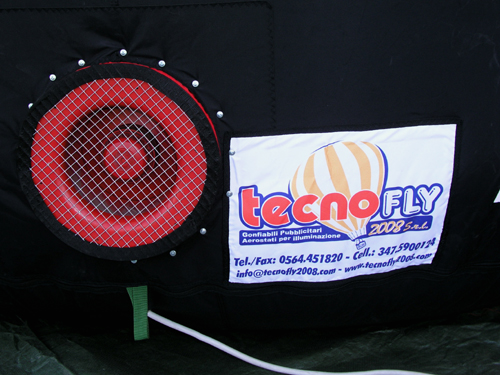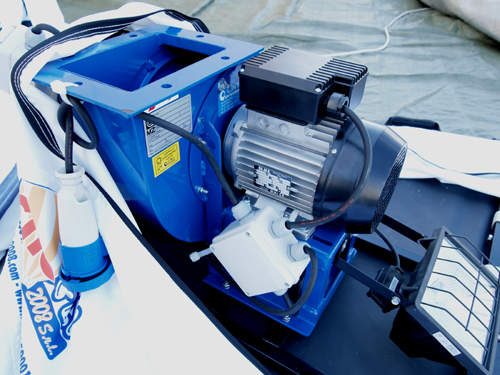

Under this name we group various types of inflatables, from traditional silhouettes in the shape of balloon to flashy and impressive giant balls. Many people wonder why an inflatable ball. The reasons are mainly a quick installation, a small size when deflated and an exceptional visibility.
First, it is an inflatable, which is a pressostatic structure more or less heavy inflated thanks to a powerful electric blower. The blower draws air from the outside and pushes it inside the inflatable, ensuring an internal air pressure adequate to maintain the shape of the inflatable. It is therefore a non-rigid structure that can be inflated and remain swollen only thanks to the constant internal air pressure ensured by the blower. The spherical shape or balloon shape is chosen by the customer, these two are the most typical forms for exhibitions, sports and manifestations, where it is necessary to "catch" the eye of the public in a way effective and versatile at the same time.
No, an inflatable ball, ball-shaped or balloon, absolutely can not fly, since it is inflated with air. The inflatable is substantially a closed bag of fabric, kept inflated by internal pressure provided by the electric blower. Even if the shape resembles a hot-air balloon, in reality it is a balloon inflated with cold air, which can not develop any aerostatic thrust upwards and is not able to lift the ball.
Another question often asked is how a ball-shaped or balloon-shaped inflatable can remain upright. The answer is simple: initially the balloon is inflated while it is lying on one side, subsequently, with the help of two or more operators, the balloon is put in vertical position and then is anchored at multiple points in a radial manner. In this operation of tensioners are used, which are strips of high tensile strength, which are fixed firmly to the ground or other stable structures.
Yes, the blower must always remain on, because it ensures a constant pressure inside the inflatable, essential to overcome the weight of the tissue that tends to squeeze down, and to let the inflatable assume the required shape. This means that if one cuts off the current supply to the motor blower, the inflatable deflates, more or less quickly depending on the type.
The placement of the blower can be internal to the inflatable (by us
called "drowned blower") or in an
 appropriate box with external cladding and insulation. TecnoFly 2008 Srl prefers
the internal solution because it is less cumbersome, more elegant, practical,
and already soundproofed. As shown in the figure, only the suction mouth comes
out of the inflatable, so this system is very practical, since it allows not to
occupy more space on the outside of the inflatable. Other producers instead
adopt the external type, using special blowers enclosed in boxes of plastic
material which in addition to protecting the engine ensure the correct
soundproofing. In the case of the engine "drowned" the noise of the motor is
dissipated inside the inflatable without the use of other systems.
appropriate box with external cladding and insulation. TecnoFly 2008 Srl prefers
the internal solution because it is less cumbersome, more elegant, practical,
and already soundproofed. As shown in the figure, only the suction mouth comes
out of the inflatable, so this system is very practical, since it allows not to
occupy more space on the outside of the inflatable. Other producers instead
adopt the external type, using special blowers enclosed in boxes of plastic
material which in addition to protecting the engine ensure the correct
soundproofing. In the case of the engine "drowned" the noise of the motor is
dissipated inside the inflatable without the use of other systems.
The absorbed power is different depending on the motor used, which must be
selected according to the type and size of the inflatable.
 The predominant factor is the internal pressure, which must be adapted to the
weight of the inflatable, and therefore is different depending on the size and
the fabric of the inflatable. We can say that for a simple ball or balloon of
medium size (height about 6 meters) the power consumption is between 200 and
350 Watts. These values are indicative, since the engine during the phase of
inflation has a different number of revolutions respect to when the inflatable
is swollen and only needs to be maintained inflated. Particular attention should
be paid to those cases wherein the inflatable balloon is installed in an area
with a high intensity of wind. Excessive wind force deforms the ball, pressing
the surface, and tends to skew it. The strength of the inflatable in these
special cases is put to the test, since the pressure exerted by the wind on the
outer surface is considerably greater than the internal pressure that the
blower can maintain. In these circumstances, especially when these balloons are
installed on the roofs very exposed to the wind, it is necessary to employ a
very powerful motor, with pressure and flow rate higher than the standard used
for normal installations, and these engines can reach power of 1200 Watts.
The predominant factor is the internal pressure, which must be adapted to the
weight of the inflatable, and therefore is different depending on the size and
the fabric of the inflatable. We can say that for a simple ball or balloon of
medium size (height about 6 meters) the power consumption is between 200 and
350 Watts. These values are indicative, since the engine during the phase of
inflation has a different number of revolutions respect to when the inflatable
is swollen and only needs to be maintained inflated. Particular attention should
be paid to those cases wherein the inflatable balloon is installed in an area
with a high intensity of wind. Excessive wind force deforms the ball, pressing
the surface, and tends to skew it. The strength of the inflatable in these
special cases is put to the test, since the pressure exerted by the wind on the
outer surface is considerably greater than the internal pressure that the
blower can maintain. In these circumstances, especially when these balloons are
installed on the roofs very exposed to the wind, it is necessary to employ a
very powerful motor, with pressure and flow rate higher than the standard used
for normal installations, and these engines can reach power of 1200 Watts.
No, an inflatable balloon is designed to work with certain internal pressures. The blower motor is chosen in a manner adapted to the size and fabric of the inflatable for which the product is effective and safe.
For indoor use we have inflatables made of flame retardant fabric, such as nylon cl.1, available in various colors. TecnoFly 2008 Srl sells only safe inflatables, in compliance with the regulations.
The certificates that are always provided with the inflatable are the CE Conformity, and the certification of the blower motor 100% Italian. Moreover TecnoFly 2008 Srl ensures a 100% Italian, from design and cutting of fabrics, sewing and assembly of the blower motor.
The customization of an inflatable balloon can be done with different methods, depending on the budget that the client wishes to invest in the inflatable. These are three possible solutions:
Certainly the digital printing of an inflatable is more expensive than the other
 solutions, but it makes not only the inflatable more attractive, but also a
closed solution, since the inflatable comes already printed and can not be
changed from an advertising perspective. The most versatile solution, and also
most used, is to use the free areas of the inflatable for the application of
interchangeable advertising banners. These areas can be the equator and the
base. For example a balloon-shaped inflatable with interchangeable banner allows
to use the same balloon to advertise different events by simply replacing the
banner. The banner envelops the entire equator and is not a simple rectangular
banner as would be expected. Sometimes it is cheaper to sew directly on the
inflatable laser plotter-cut graphics, the result is very nice, professional and
visually striking. In this case a monochromatic tissue is first suitably
laser-cut, then glued on the inflatable with strong double-side adhesive, and
then sewn with tris-tris machine.
solutions, but it makes not only the inflatable more attractive, but also a
closed solution, since the inflatable comes already printed and can not be
changed from an advertising perspective. The most versatile solution, and also
most used, is to use the free areas of the inflatable for the application of
interchangeable advertising banners. These areas can be the equator and the
base. For example a balloon-shaped inflatable with interchangeable banner allows
to use the same balloon to advertise different events by simply replacing the
banner. The banner envelops the entire equator and is not a simple rectangular
banner as would be expected. Sometimes it is cheaper to sew directly on the
inflatable laser plotter-cut graphics, the result is very nice, professional and
visually striking. In this case a monochromatic tissue is first suitably
laser-cut, then glued on the inflatable with strong double-side adhesive, and
then sewn with tris-tris machine.
Certainly the ease of transport depends on the size of the inflatable, the greater the size, the greater the weight. However TecnoFly 2008 Srl has studied the special bags which, unlike the common transport pockets, first "wrap" the inflatable, deflated and folded, then tighten it with suitable tensioners that significantly reduce the total volume of the bag. This is a fundamental point that not all suppliers of inflatables want to face, ignoring the container of the inflatable. Instead, it is important to use a special bag as ours, both for the transport for the storage of the inflatable.
Ordering your inflatable is simple. Send us an e-mail to info@tecnofly2008.com describing in as much detail as possible the shape, for example taking a cue from our photo gallery. Or send us a drawing, also done by hand, with a description of the details of your interest, our technical staff will advise you the right type of inflatable you most enjoy. We are happy to tailor make the balloon.
|
|
|
|
|
|
|
|
|
|
|
|
The cold air inflatables are made usually with bright colors, which tend to attract attention and boost the visibility of the inflatable. An inflatable often is constructed with fabrics already with a base color, as rolls of fabric are produced according to the requests. However we can print directly onto the fabric with digital obtaining each type of gradient, for a perfect and faithful reproduction of the object you want to "enlarge". During the design we prefer vector graphics file format as they can be resized without losing quality. The most widely used programs for file processing in vector format are Adobe Illustrator, Freehand, Corel Draw, and vector file formats can be ai, eps, pdf, cdr with all fonts converted to curves. Raster files are only used for digital printing, but must be of a format you can print, as too low resolution does not produce good results. Typical programs used for rasterization files are Photoshop and Paintshop Pro, which generate files of type jpg, tif, psd.